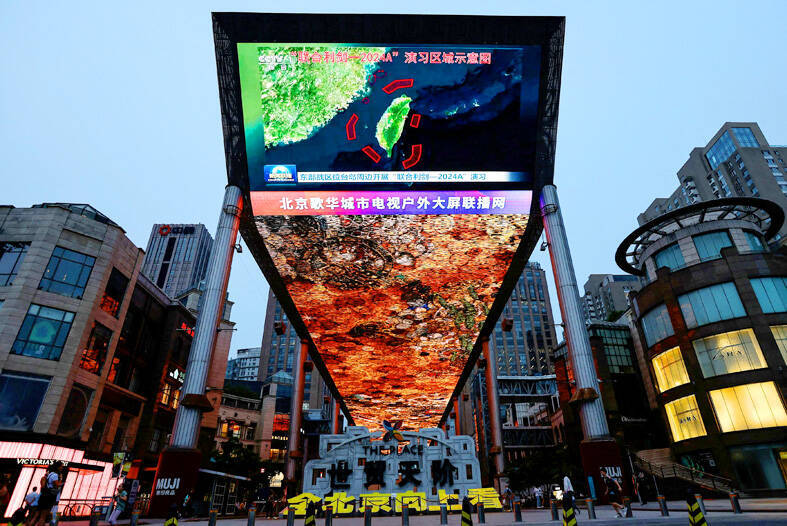《TAIPEI TIMES》 Companies mull moving Taiwan staff from China

A large screen shows news footage of a map of military drills conducted by the Eastern Theater Command of the Chinese People’s Liberation Army in five areas around Taiwan, in Beijing on May 23. Photo: Reuters
By Laurie Chen / Reuters, BEIJING
Some foreign companies are considering moving Taiwanese employees out of China after Beijing said it could impose the death penalty on “die-hard” Taiwanese independence advocates, four people familiar with the matter said.
The new guidelines have caused some Taiwanese expatriates and foreign multinationals operating in China to scramble to assess their legal risks and exposure, said the people, who include a lawyer and two executives with direct knowledge of the discussions.
“Several companies have come to us to assess the risks to their personnel,” said the lawyer, James Zimmerman, a Beijing-based partner at the Perkins Coie law firm.
He declined to identify the companies or industries for confidentiality reasons.
“The companies are still concerned that there may be some gray areas, such as whether a benign social media post or voting for a particular political party or candidate in Taiwan elections could be interpreted as engaging in pro-independence activities,” Zimmerman said.
Reuters has previously consulted Perkins Coie on unrelated matters in China.
As of 2022, about 177,000 Taiwanese were working in China, according to the most recent Taiwanese government survey.
Taiwanese staff are employed by many multinationals in China, given their linguistic abilities and cultural familiarity with the country.
Many more work for the myriad Taiwanese firms that operate in China and have, by the Taiwanese government’s estimate, invested more than US$200 billion since 1991, helping fuel China’s growth to become the world’s second-biggest economy.
Some foreign firms operating in China have held meetings with employees on safety, said the two executives, who asked not to be named due to the sensitivity of the matter.
Another source, who was briefed on the matter, said some Taiwanese staff in China have received and accepted the option to leave the country.
The June 21 guidelines criminalize promoting Taiwan’s entry to international organizations where statehood is a condition, having external official exchanges, and suppressing parties, groups and people that promote “reunification.”
Also illegal are “other acts that seek to separate Taiwan from China” — phrasing that allows Beijing to interpret the rules broadly, legal experts said.
Among “the ringleaders or those who have committed serious crimes,” the guidelines say, “if the harm to the country and the people is particularly serious and the circumstances are particularly bad, they may be sentenced to death.”
The regulations do not further specify who might be subject to the death penalty.
Asked how companies and Taiwanese employees are reacting to the guidelines, the Chinese Ministry of Foreign Affairs told Reuters in a statement: “Using criminal law measures to punish criminal separatist elements and uphold the country’s core interests is a common practice for all countries.”
“It needs to be emphasized that the relevant legislative document targets the extreme minority of die-hard ‘Taiwan independence’ elements and their separatist activities, and does not implicate the vast majority of Taiwan compatriots,” the ministry said.
China’s Taiwan Affairs Office did not respond to a request for comment.
Last week, it said the vast majority of Taiwanese have nothing to worry about and can travel there “in high spirits.”
Taiwan’s Mainland Affairs Council, which oversees relations with Beijing, told Reuters in a statement: “The government reminds Taiwanese businesspeople and Taiwanese employees in mainland China that they must pay more attention to their personal safety now. The risk is indeed increasing.”
Last week, the council urged Taiwanese to avoid non-essential travel to China, Hong Kong and Macau due to the new regulations.
The council last month said that eight retired Taiwanese military and police officers had been detained in China over the previous year.
Last year, it warned that Taiwanese academics were being detained and interrogated upon entry to China, even if they were on formal exchange programs.
One of the executives who spoke to Reuters — a senior official who works with Taiwanese investors in China — said his phone lit up after China announced the new guidelines as people discussed what they could mean for their work.
He said the guidelines add to the uncertainty of doing business in China, coming on the heels of such measures as China’s anti-espionage law and its National Security Law for Hong Kong.
The second executive, who works for a large multinational whose Taiwanese executives frequently go on business trips to China, said they had been having regular meetings with senior managers to asses the danger and whether to withdraw those who are working in the country.
“It’s not yet gotten to the stage of deciding not to send them there, but we are reviewing the risk daily,” the executive said.
Sung Wen-ti (宋文笛), a fellow at the Atlantic Council’s Global China Hub, said the guidelines would force foreign companies to “either move their operations out entirely to keep Taiwanese talent or they stop hiring Taiwanese talent.”
That would mean that “even fewer Taiwanese will be working or living in China, thereby making Beijing’s attempts to win over their hearts and minds even harder,” Sung said.
新聞來源:TAIPEI TIMES















